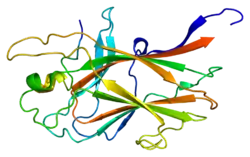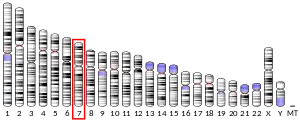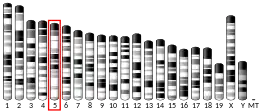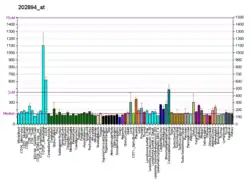Ephrin type-B receptor 4 is a protein that in humans is encoded by the EPHB4 gene.[5][6]
Ephrin receptors and their ligands, the ephrins, mediate numerous developmental processes, particularly in the nervous system. Based on their structures and sequence relationships, ephrins are divided into the ephrin-A (EFNA) class, which are anchored to the membrane by a glycosylphosphatidylinositol linkage, and the ephrin-B (EFNB) class, which are transmembrane proteins. The Eph family of receptors are divided into 2 groups based on the similarity of their extracellular domain sequences and their affinities for binding ephrin-A and ephrin-B ligands. Ephrin receptors make up the largest subgroup of the receptor tyrosine kinase (RTK) family. The protein encoded by this gene binds to ephrin-B2 and plays an essential role in vascular development.[6][7]
References
- 1 2 3 GRCh38: Ensembl release 89: ENSG00000196411 - Ensembl, May 2017
- 1 2 3 GRCm38: Ensembl release 89: ENSMUSG00000029710 - Ensembl, May 2017
- ↑ "Human PubMed Reference:". National Center for Biotechnology Information, U.S. National Library of Medicine.
- ↑ "Mouse PubMed Reference:". National Center for Biotechnology Information, U.S. National Library of Medicine.
- ↑ Bennett BD, Wang Z, Kuang WJ, Wang A, Groopman JE, Goeddel DV, Scadden DT (Jun 1994). "Cloning and characterization of HTK, a novel transmembrane tyrosine kinase of the EPH subfamily". J Biol Chem. 269 (19): 14211–8. doi:10.1016/S0021-9258(17)36776-5. PMID 8188704.
- 1 2 "Entrez Gene: EPHB4 EPH receptor B4".
- ↑ Gerety SS, Wang HU, Chen ZF, Anderson DJ (1999). "Symmetrical mutant phenotypes of the receptor EphB4 and its specific transmembrane ligand ephrin-B2 in cardiovascular development". Mol. Cell. 4 (3): 403–14. doi:10.1016/S1097-2765(00)80342-1. PMID 10518221.
Further reading
- Flanagan JG, Vanderhaeghen P (1998). "The ephrins and Eph receptors in neural development". Annu. Rev. Neurosci. 21: 309–45. doi:10.1146/annurev.neuro.21.1.309. PMID 9530499.
- Zhou R (1998). "The Eph family receptors and ligands". Pharmacol. Ther. 77 (3): 151–81. doi:10.1016/S0163-7258(97)00112-5. PMID 9576626.
- Holder N, Klein R (1999). "Eph receptors and ephrins: effectors of morphogenesis". Development. 126 (10): 2033–44. doi:10.1242/dev.126.10.2033. PMID 10207129.
- Wilkinson DG (2000). "Eph receptors and ephrins: regulators of guidance and assembly". Int. Rev. Cytol. International Review of Cytology. 196: 177–244. doi:10.1016/S0074-7696(00)96005-4. ISBN 9780123646002. PMID 10730216.
- Xu Q, Mellitzer G, Wilkinson DG (2001). "Roles of Eph receptors and ephrins in segmental patterning". Philos. Trans. R. Soc. Lond. B Biol. Sci. 355 (1399): 993–1002. doi:10.1098/rstb.2000.0635. PMC 1692797. PMID 11128993.
- Wilkinson DG (2001). "Multiple roles of EPH receptors and ephrins in neural development". Nat. Rev. Neurosci. 2 (3): 155–64. doi:10.1038/35058515. PMID 11256076. S2CID 205014301.
- Andres AC, Reid HH, Zürcher G, et al. (1994). "Expression of two novel eph-related receptor protein tyrosine kinases in mammary gland development and carcinogenesis". Oncogene. 9 (5): 1461–7. PMID 8152808.
- Berclaz G, Andres AC, Albrecht D, et al. (1996). "Expression of the receptor protein tyrosine kinase myk-1/htk in normal and malignant mammary epithelium". Biochem. Biophys. Res. Commun. 226 (3): 869–75. doi:10.1006/bbrc.1996.1442. PMID 8831703.
- Ephnomenclaturecommittee (1997). "Unified nomenclature for Eph family receptors and their ligands, the ephrins. Eph Nomenclature Committee". Cell. 90 (3): 403–4. doi:10.1016/S0092-8674(00)80500-0. PMID 9267020. S2CID 26773768.
- Nikolova Z, Djonov V, Zuercher G, et al. (1998). "Cell-type specific and estrogen dependent expression of the receptor tyrosine kinase EphB4 and its ligand ephrin-B2 during mammary gland morphogenesis". J. Cell Sci. 111 (18): 2741–51. doi:10.1242/jcs.111.18.2741. PMID 9718367.
- Tang XX, Brodeur GM, Campling BG, Ikegaki N (1999). "Coexpression of transcripts encoding EPHB receptor protein tyrosine kinases and their ephrin-B ligands in human small cell lung carcinoma". Clin. Cancer Res. 5 (2): 455–60. PMID 10037197.
- Dalva MB, Takasu MA, Lin MZ, et al. (2001). "EphB receptors interact with NMDA receptors and regulate excitatory synapse formation". Cell. 103 (6): 945–56. doi:10.1016/S0092-8674(00)00197-5. PMID 11136979. S2CID 7698822.
- Wilson MD, Riemer C, Martindale DW, et al. (2001). "Comparative analysis of the gene-dense ACHE/TFR2 region on human chromosome 7q22 with the orthologous region on mouse chromosome 5". Nucleic Acids Res. 29 (6): 1352–65. doi:10.1093/nar/29.6.1352. PMC 29746. PMID 11239002.








